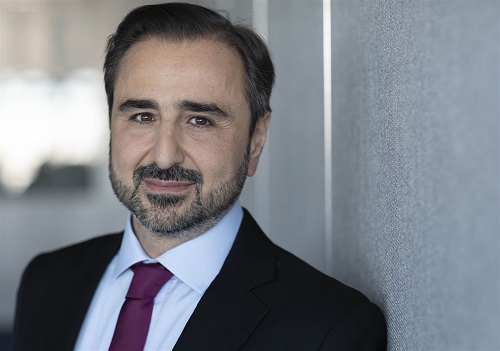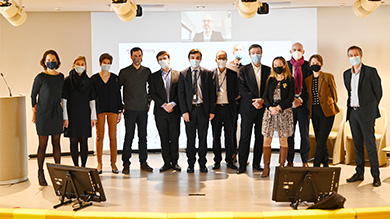Why Natixis? Because in a fast-transforming company, you can play an active role in shaping the bank of tomorrow, while building the career you really want. François Riahi (ENA, 2001), CEO of Natixis, tells us how.
An interview published in the Monde des Grandes écoles et Universités (in french only)

© Greg Gonzalez/BPCE
Can you tell us about the impact of current changes on your business?
The financial sector has been undergoing in-depth transformative change and this trend has really stepped up with today’s new technologies, changing usage and shifting expectations from both our clients and staff. So this revolution constantly drives us forward to grow and adapt with one clear strategic goal in mind – be more agile!
How is this agility visible at Natixis?
Here at Natixis, we encourage a real entrepreneurial mindset in the way we develop our business and also within our teams. A good example of this is our multi-boutique model, which we have rolled out across our asset management business and M&A operations: this model also provides the basis for our payment business, with the various start-ups we have acquired. Our ability to house several smaller companies within a group of several thousand staff really sets us apart from the rest of the market. Agility is first and foremost a mindset and we have changed Natixis’ organizational set-up to further foster this approach. We have streamlined our structure, cut back the number of management levels, entirely rethought the role of our leaders in the company and changed our working methods for our teams. Our fundamental goal is to encourage both initiative and empowerment for all our staff.
Leading through innovation
“Our positioning means we are quick to innovate, for example we are the first bank in France to offer instant payment, and we are the first worldwide to set up a green weighting factor in our financing activities to support affirmative environmental and climate action. Innovation is at the very heart of the way we work, and the only way to truly foster positive innovation is to allow teams to work closely together to come up with original solutions”.
So, does more agility mean more opportunities?
Our key focus is on our teams’ human intelligence – that’s what really provides value-added for our clients. We need entrepreneurs who can display relational intelligence, and our environment here at Natixis empowers them to achieve fulfilment and success. Today’s technological changes make the human dimension even more important than ever, and our staff truly are responsible for giving our bank its full meaning and legitimacy. The technological transformation of today’s world makes our human value-added increasingly vital for our clients as we support their growth. The services of tomorrow will not be that much different from today’s, but the real difference will be in the way they are provided.
How do you see the bank of tomorrow?
The bank of tomorrow must consistently consider what is useful and how it can stay relevant, so it is vital that we take on board the key challenges of our time – such as climate change. We believe that we have a real role to play in directing financial resources to certain sectors and certain uses such as energy transition, so we are very active in this arena.
The greenest bank in the world
“The Banker recently named Natixis the Most Innovative Investment Bank for Climate & Sustainability worldwide. When a company succeeds in aligning its growth targets, its convictions and its expertise with its clients’ needs and its staff’s expectations, then its work can really take on its full meaning …and it is incredibly effective to boot! Our ESR approach is not just a philosophical or ideological hobbyhorse, we truly support our clients as they stage the transition of their businesses towards more sustainable growth”.
Will the bank of tomorrow be male-dominated?
I have three daughters, and I truly hope that they will have the same opportunities as boys when they reach the workplace. We have developed some very strong initiatives to support gender equality right across the board at Natixis: our management fast-track program has an equal male/female split each year, and our senior management committee includes three women. We have adapted our leadership model to clearly outline just what we expect from our leaders and how we assess them. Our recruitment process resolutely includes as many women as men. So now it’s up to us to convince women that they can have a fulfilling career here at Natixis!
How can a young talent be involved in the bank’s development?
We need young talents to keep on bringing new life to our teams, as they are brimming with energy and potentially disruptive views, especially on digital initiatives. We are very interested in what they have to teach us about the transformation currently under way and the changes that lie ahead. We are seeing disruption right across today’s society, so the younger generations have a key role to play within companies. We need to encourage them to get involved as their contribution is invaluable!
International Graduate Program
“Talent is the key asset for any company in the financial sector, and we are particularly keen to help our talented staff develop via our ambitious Natixis Leadership Program. We also want to attract new young talent, so our Graduate Program is a good example of this, with young international business school graduates spending a total of 18 months across three of our international offices to find out all about the various career paths open to them in the finance industry. We also have a number of initiatives to encourage job mobility and geographical mobility, with our short-term assignments in different countries. An overall view of our business lines and an international mindset are vital success enablers at Natixis.”
Do you have a particular message for young graduates?
The most important point I’d like to make is that finance is useful. The sector has probably been the most active in creating the growth and innovation society that we have enjoyed since the industrial revolution and it will continue to play an extremely important role. You shouldn’t see finance as a world of power and wealth but rather a truly useful industry, where you can really continue building the world of tomorrow. The second key point is that we are living through an era of incredible technological transformation, which is overturning the established order and enabling staff to find new meaning in their work. So scope to change today’s society and build the world of tomorrow should be an important factor in the choices you make.
Nelson Mandela on his university photo
“There was a very fierce debate on the name we chose for our year class, and we finally opted for Nelson Mandela, who was still alive at the time. A fellow student who had been on an internship in South Africa was a fervent advocate of this choice and he promised that he would get Nelson Mandela to come to ENA, our school… and he did! All the students were there, even those who had voted for another name, and we were all thrilled to pose for a photo with him. This is still a very important memory for me – even now”.
“Natixis is an international, innovative, agile and useful financial institution”.














